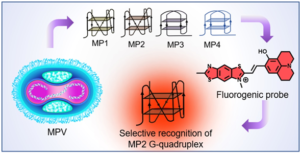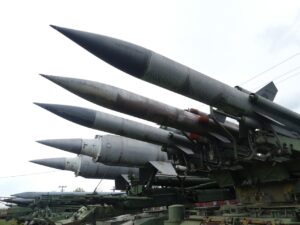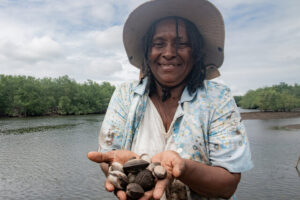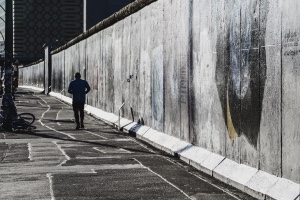
Berlin Wall
The Berlin Wall
“Washington’s policy of containing the development of Russia and China as one of the reasons for deepening tension”
Moscow: Russia today said while the current global military-political situation has “indeed” similarities with the cold war period, at present both Russia and the USA were “far from the worst point of the Soviet-American confrontation like the Carribean crisis of 1962, when they were “literally on the brink of a nuclear war”.
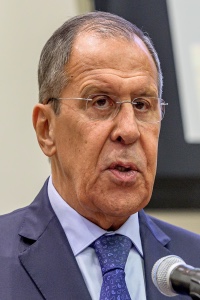
In an interview with Hungarian newspaper Magyar Nemzet, today, Russian Foreign Minister Sergey Lavrov, however, made it clear that “one cannot ignore the current disagreements between major global players, which, unfortunately, continue to deepen”.
Lavrov blamed Washington’s policy of containing the development of Russia and China as “one of the reasons for this (deepening tension). The unilateral dismantling of the system of arms control agreements, the buildup of US military capabilities in the European and Pacific theatres are definitely part of this policy, he said.
He, however, alluded to the joint statement that was adopted following the Geneva meeting between the presidents of Russia and the United States, confirming their mutual adherence to the principle first declared 35 years ago that there can be no winners in a nuclear war and it should never be unleashed.
“On the American side, this was the second step this year – after the New START extension – towards restoring a responsible approach to key aspects of international security,” he said.
The first round of the US-Russian strategic stability dialogue held on July 28 in Geneva to follow up on the June summit between their leaders was encouraging news as well. “The two countries should also start collaborating on cybersecurity and establish systemic cooperation in responding to common challenges,” Lavrov said and pointed out that the president of Russia had clearly indicated, including publicly, that the two nations can achieve results in all areas – but only through negotiations and finding a balance of interests that would suit both sides.
“Be that as it may, we are realists and understand that the path towards de-escalation will be difficult. Unlike in the Cold War era, Russian-American agreements are not the cornerstone of everything, although much still depends on them. There are far more players and factors influencing the international security situation today. As a permanent member of the UN Security Council, Russia will continue to make its significant contribution to maintaining global stability by pursuing a responsible, pragmatic and predictable foreign policy aimed at neutralising threats and challenges to global security, as well as at creating favourable conditions for the peaceful development of all states,” he said.
Referring to the European Union and US sanctions against Russia, he said sanctions were an inadequate political instrument, “and what is more, they are futile when applied to Russia”.
Also read: United States imposes fresh sanctions on Russia for poisoning Navalny
He pointed out that the anti-Russian restrictions imposed by the European Union in 2014 have cut the trade between Russia and the EU by more than half. While in 2013, the trade between Russia and the EU was estimated at $417.7 billion, in 2020 it stood at just 192.2 billion. He mentioned that some of Russia’s trade partners in Europe including Hungary have suffered from the consequences.
“It is important to point out that the EU sanctions are mostly hitting the more recent EU members harder while seasoned members are even managing to benefit from the situation, as my colleague Peter Szijjarto has repeatedly stressed by quoting rather telling statistics,” he claimed.
Responding to a pointed question that a number of European countries do not trust Russia, and are criticising the construction of the Nord Stream 2 gas pipeline, saying that Europe will become even more dependent on Russia, Lavrov said Russia considered the Nord Stream 2 gas pipeline a solely commercial, mutually beneficial project. “Concerns that it will make Europe more dependent on Russia are groundless. It is more accurate, we believe, to speak about a positive interdependence because Russia is also interested in selling its goods, in this case, energy, to the Europeans.”
According to him the launch of Nord Stream 2 will provide for an additional diversification of gas delivery routes without increasing the volume of gas deliveries at this time. Sustainable gas supplies to European customers will travel the shortest route, which will help to reduce the environmental impact. In addition, we are not abandoning the existing agreements on gas deliveries to Europe; however, the transit countries will have to compete for the right of transit, instead of trying to dictate their own conditions.
“Thus, strategically speaking, Nord Stream 2 will improve Europe’s energy security for decades ahead. That is why the interested European capitals are set on finishing the construction of the pipeline,” he said.
Stating that trust was a complex issue, he said Russia’s trust in many of its European partners in the energy sphere had been seriously undermined. “In May 2019, the EU adopted amendments to the so-called gas directive of the Third Energy Package, tailored to the Nord Stream 2 project. They were adopted post factum, when the main investments had already been made. It was a blow to one of the fundamental principles of market relations: the protection of the rights of conscientious investors. Naturally, this dented our confidence in the reliability of our partners,” he said.
He added that it takes time to rebuild trust. “The first constructive step by the European Union could be abandoning the attempts to politicise its trade and economic interaction with Russia,” he said. He clarified that Russia was always open to constructive cooperation based on equality, mutual respect and consideration for each other’s interests. “Now the ball is in the EU’s court,” he said.
Referring to Ukraine which does not recognise its Russian and Hungarian minorities as indigenous peoples and where the country’s new education law restricts the use of these ethnic groups’ native languages, Lavrov said the continuing degradation of fundamental human rights in Ukraine “is definitely alarming”. He added: “On July 21, [Ukraine’s President] Vladimir Zelensky signed a discriminatory law, On the Indigenous Peoples of Ukraine. Along with the previously adopted laws on the state language and on education, the new legislation seriously infringes on the interests of Russians, Hungarians and other peoples historically living in various regions of modern Ukraine. In fact, we are witnessing an artificial division of the country’s population into categories with different sets of rights, which is very similar to the theory and practice used by Nazi Germany.”
Also read: Ahead of Ukrainian President’s Washington visit, Moscow moves international courts against Kyiv
He warned that Kiev’s steps to impose the ideology of nationalist intolerance in Ukraine, primarily in relation to Russians, “are absolutely unacceptable”. He pointed out that as a reminder, in early August, Commissioner for the Protection of the State Language Taras Kremin proposed all non-Ukrainian-speaking residents of Ukraine should leave the country. “Vladimir Zelensky in an interview published on August 5 recommended that Russians should “leave and seek a place in Russia.” We regard such statements as inciting ethnic hatred. Incidentally, this is a crime in the European Union countries,” Lavrov said.
“We have repeatedly alerted specialised international agencies at the UN, OSCE, Council of Europe, and UNESCO about such excessive manifestations. We will continue to push for Kiev to fulfil its obligations to respect human rights, including the cultural and educational rights of ethnic minorities…The so-called quiet diplomacy our Western colleagues often resort to is clearly not working in relation to Ukraine,” he said.
– global bihari bureau


